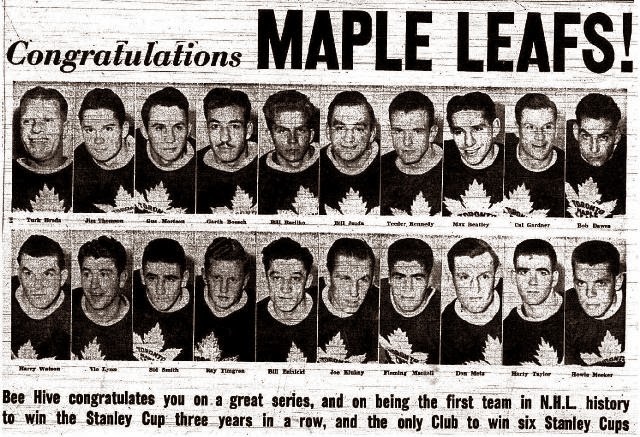The title of this piece - "Mighty Smitty" - appeared above the scoring summary published in the Toronto Telegram the next day. So, there's a clue as to the direction we are heading towards.
But first, some background leading up to Smith's historic night.
A Toronto native, Sid Smith spent the majority 0f 1948-49 skating for the Pittsburgh Hornets, Toronto's farm team in the American Hockey League. Determined to make his way back to the parent club, Smith put together a spectacular season in Pittsburgh.
The numbers tell the story of his assault on those who worked between the pipes. In 68 contests, Smith found the back of the net 55-times and he assisted on 57 other tallies. His offensive production netted him the John B. Sollenberger Trophy, an award given to the top scorer.
Come playoff time, the Leaf brass had high hopes that Smith's hot-hand would continue once he was summoned from the Hornets.
In the opening round against Boston, Smith buried the puck twice, but his best effort was yet to come.
Hap Day's squad took game one of the Stanley Cup final, beating Detroit in their own barn.
When the next encounter on April 10th came to a conclusion, Sid Smith had earned a spot in the hockey history books.
As a result of scoring 3 goals on the power-play in Toronto's 3-1 victory, Smith became the first and only player to do this in a Cup final game.
This year marks the 65th anniversary of Smith's special performance.
"I had to get the last three for the coach," Smith told reporter Allan Nickleson. "He told me he wanted to see me play a good game on the road."
Also, Smith commented on the contributions made by his linemates - Fleming MacKell and Ted Kennedy.
"MacKell is skating fast and making lots of good plays," Smith explained. "He's setting both Kennedy and myself up with his hard skating."
Then, Smith shifted his focus to Ted Kennedy.
"When Teeder makes a pass, he really lays it in there nicely," Smith gave an example of Kennedy's ability to thread-the-needle. "That's how I got the last goal. Ted played it perfectly to give me the puck in front of the net and I backhanded one that went in the opposite corner to where Harry Lumley was. On all three of the goals, the puck never left the ice."
Toronto went on to win the Cup over Detroit and in the process ventured into new territory becoming the first to win three consecutive championships and the first to capture six Stanley Cups.
While several franchises have since travelled down the same path as the '49 Maple Leafs, no player has been able to duplicate Sid Smith's evening of April 10, 1949.






No comments:
Post a Comment
Note: Only a member of this blog may post a comment.